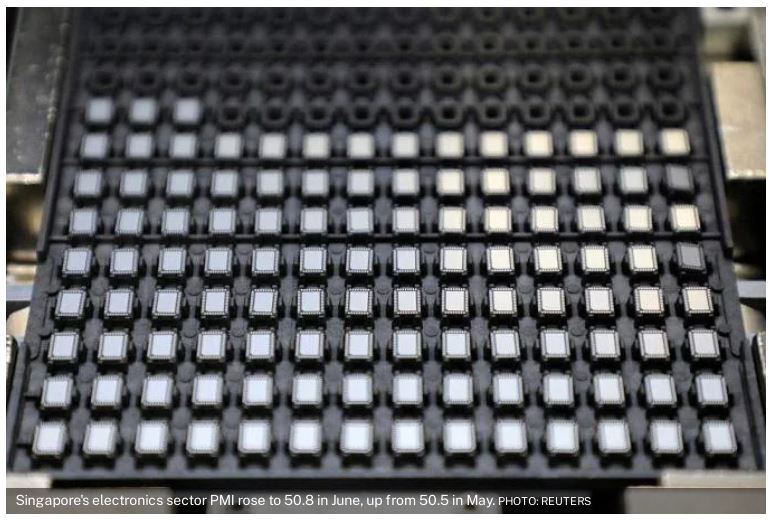Singapore PMI slips to 50.3 in June, but electronics outlook improves
OVERALL factory activity in Singapore expanded at a slower rate in June, but growth in the key electronics sector gathered steam, according to latest figures from the Singapore Institute of Purchasing and Materials Management (SIPMM) on Monday (Jul 4).
Singapore’s Purchasing Managers’ Index (PMI) was 50.3 in June, down 0.1 point from 50.4 a month ago, though this was still its 24th straight month in expansion.
A reading above 50 on the industry sentiment indicator represents growth from the previous month, and one below 50 means a contraction.
The linchpin electronics sector, however, posted a faster rate of expansion at 50.8, up from 50.5 in the previous month, despite headwinds such as global growth slowdowns, recession fears, Covid-19 disruptions and the ongoing Russia-Ukraine conflict. This was its 23rd consecutive month of expansion.
The latest electronics PMI reading indicates “strong performance for the electronics industry”, said Sophia Poh, industry engagement and development vice-president at SIPMM.
Together with the overall manufacturing sector’s continued expansion in the first half of the year, “this positive outlook is indeed heartening, considering several headwinds facing the Singapore economy, and primarily due to the continuing Russia-Ukraine conflict”, she said.
Selena Ling, chief economist at OCBC, said: “Global demand for electronics remains resilient, aided by the ongoing chip shortage… While some chip producers think some of the supply bottlenecks will start to ease from Q3, others believe it may extend to 2024.”
She expects growth momentum in the domestic electronics industry to hold up in the near term.
SIPMM attributed June’s PMI reading to faster expansion rates in the key indexes of new orders, new exports and factory output, as well as a return to expansion in the inventory index and supplier deliveries index.
While the employment index posted a slower expansion, imports and input prices indexes expanded more quickly. The finished goods index posted marginally slower contraction whereas the order backlog recorded slightly faster expansion.
Singapore’s slower but still expansionary PMI reading is in line with a muted regional picture in June, with China being the main exception.
With the lifting of Covid-19 lockdowns, China’s official manufacturing PMI rose above the 50-point handle for the first time since February this year, matching that month’s reading at 50.2, up from 49.6 in May.
Junyu Tan, an economist for the Asia-Pacific region at Natixis CIB, said in a research note that China’s manufacturing activity is likely to recover more quickly from Covid-19 restrictions than non-manufacturing activity, as experiences of re-opening have shown that the resumption of factory activities was usually prioritised over the easing of household mobility restrictions.
China’s Caixin manufacturing PMI, which focuses on smaller and external-oriented manufacturers, rose well above analyst expectations to 51.7 in June, breaking out of a 3-month streak of decline.
But other East Asian PMIs slowed in June. South Korea’s seasonally adjusted manufacturing PMI eased to 51.3 from 51.8 in May, as output levels fell at the fastest pace in 7 months.
The au Jibun Bank Japan PMI fell to 52.7 points, from 53.3 in May, while the S&P Global Taiwan manufacturing PMI was underwater in June, dropping to 49.8 points from a stagnant 50 in the previous month – the first time in 2 years that it fell below the neutral 50 mark.
In Asean, the S&P Global Asean manufacturing PMI of 52 was the second-softest in the past 9 months of expansion, slightly down from May’s 52.3 reading.
“The latest PMI data signalled a further loss in growth momentum across the Asean manufacturing sector,” said Maryam Baluch, economist at S&P Global Market Intelligence. “Surging inflation, raw material shortages and energy price hikes, impacted each region in one way or another.”
Of the 7 Asean members in the report, all but Myanmar had PMIs in expansion in June, though growth was slowing in 4 of them.
Still, sentiment was positive across the Asean manufacturing sector, Baluch said, with the region’s manufacturers hopeful that output would expand in the coming 12 months.
Source: https://www.businesstimes.com.sg/government-economy/singapore-pmi-slips-to-503-in-june-but-electronics-outlook-improves


 English
English




